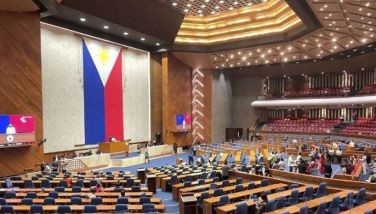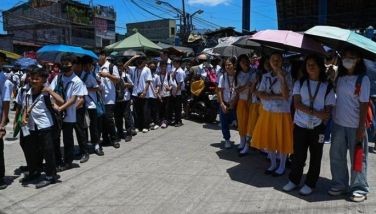Gov’t distributes updated security handbooks vs terror to OFWs
May 10, 2006 | 12:00am
RIYADH — With terrorism now among the threats facing Filipino workers abroad, the Philippine government is distributing updated handbooks on safety and security in dealing with terror attacks, including chemical and biological.
The Safety and Emergency Handbooks for Overseas Filipino Workers (OFWs) for 2006 was amended from its first edition in 2003, according to Ambassador Roy Cimatu, the country’s special envoy to the Middle East.
Cimatu, who heads the Middle East Preparedness Team, said they had to update the handbook following increasing terror attacks in the region that killed some Filipinos.
"No one can ever predict as to when an emergency crisis may happen or occur," President Arroyo said in the handbook’s message. "But we can be ready and prepared to save lives and property."
"This handbook is geared towards contributing to the level of preparedness and readiness of our OFWs to respond to any emergency crisis that may endanger their persons and property while working overseas," she said.
Two Filipinos were killed and three other OFWs were wounded here last February after Saudi security forces manning a checkpoint fired at the vehicle they were in as it drove through the gauntlet.
The Saudi police at that time were conducting pursuit operations against suspected al-Qaeda militants who raided an oil depot in Riyadh.
Labor Secretary Patricia Sto. Tomas said the global employment environment continues to rapidly change that it now has to deal with security risks and threats that could affect OFWs.
"I believe one of the things our OFWs should be mindful about before going abroad is how to be prepared and be ready for any emergency situation," Sto. Tomas said.
The 61-page handbook has five chapters dealing with various issues and even details how OFWs should respond to a chemical or biological attack.
Chapter one tackles general topics and guidelines on emergencies.
Chapter two deals with "precautionary measures against acts of terrorism."
Chapter three is titled "Primary Information on Biological and Chemical Warfare Agents."
Chapter four mentions guidelines on the management of casualties of chemical attacks and the last chapter gives advice to OFWs in Iraq.
The Safety and Emergency Handbooks for Overseas Filipino Workers (OFWs) for 2006 was amended from its first edition in 2003, according to Ambassador Roy Cimatu, the country’s special envoy to the Middle East.
Cimatu, who heads the Middle East Preparedness Team, said they had to update the handbook following increasing terror attacks in the region that killed some Filipinos.
"No one can ever predict as to when an emergency crisis may happen or occur," President Arroyo said in the handbook’s message. "But we can be ready and prepared to save lives and property."
"This handbook is geared towards contributing to the level of preparedness and readiness of our OFWs to respond to any emergency crisis that may endanger their persons and property while working overseas," she said.
Two Filipinos were killed and three other OFWs were wounded here last February after Saudi security forces manning a checkpoint fired at the vehicle they were in as it drove through the gauntlet.
The Saudi police at that time were conducting pursuit operations against suspected al-Qaeda militants who raided an oil depot in Riyadh.
Labor Secretary Patricia Sto. Tomas said the global employment environment continues to rapidly change that it now has to deal with security risks and threats that could affect OFWs.
"I believe one of the things our OFWs should be mindful about before going abroad is how to be prepared and be ready for any emergency situation," Sto. Tomas said.
The 61-page handbook has five chapters dealing with various issues and even details how OFWs should respond to a chemical or biological attack.
Chapter one tackles general topics and guidelines on emergencies.
Chapter two deals with "precautionary measures against acts of terrorism."
Chapter three is titled "Primary Information on Biological and Chemical Warfare Agents."
Chapter four mentions guidelines on the management of casualties of chemical attacks and the last chapter gives advice to OFWs in Iraq.
BrandSpace Articles
<
>
- Latest
- Trending
Trending
Latest
Trending
Latest
Recommended































